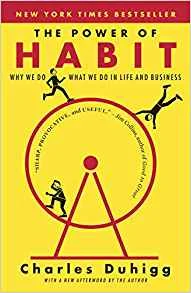Executive Bookshelf : The Power of Habit: Why We Do What We Do in Life and Business - Charles Duhigg
Synopsis
In The Power of Habit, award-winning business reporter Charles Duhigg takes us to the thrilling edge of scientific discoveries that explain why habits exist and how they can be changed.
Distilling vast amounts of information into engrossing narratives that take us from the boardrooms of Procter & Gamble to the sidelines of the NFL to the front lines of the civil rights movement, Duhigg presents a whole new understanding of human nature and its potential. At its core, The Power of Habitcontains an exhilarating argument: The key to exercising regularly, losing weight, being more productive, and achieving success is understanding how habits work. As Duhigg shows, by harnessing this new science, we can transform our businesses, our communities, and our lives.
Tom’s Take
The large majority of books that look at human behavior or psychology tend to be either personal narratives or dense tomes on scientific studies. Along with this dichotomy, I've noticed that most literature can be stacked as either "personal" (human behavior on a macro, individual level) or "commercial" (human actions as a member of a group). The book “The Power Of Habit” does an incredible job of not only looking at habits through differing lenses but also how to utilize one’s mind to effect change in those dynamics.
I know that for me, habits rule the roost. It's incredible to stop and think through our habitual actions – and how much we aren’t cognizant of them. There is power in realizing we can train ourselves to spot habits, while also having the ability re-wire those habits for our benefit.
Taking this a step further, as leaders we can recognize how exactly people act and why they act out of habit. This should lead us to be able to redefine products, services and communications to insert yourself into habitual processes and thoughts.
This ability to engrain a habit is a powerful notion, and one that can be used for good or evil. We’ve seen throughout history the ability for strong leaders and organizations to shape societal norms, commerce and the direction of groups. Throughout this book this nature of the psyche gave me some pause about how mailable us homo sapiens are.
Creatures of habit, indeed.
In re-evaluating my own habits, one of the hardest practices is to try and understand your own habitual cycles. The author, Charles Duhigg, defines this cycle as "cue-routine-reward." While you are in that cycle, it's nearly impossible to realize you are.
The best strategy I've found is to use friends, family as well as professional coaching to seek out unbiased opinions on our actions. This will help figure out where those cycles exist in our lives and then re-wire if necessary.
This distillation of the unseen behaviors of the human condition is incredible and the author does a mighty service in presenting it utilizing narratives along with science. Now that we know about habits, it's up to us to use that knowledge to better ourselves and to ensure the organizations we run and the societies we lead continue to improve.


